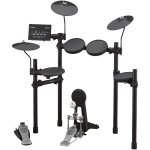I'll give you the same advice I give anyone looking to spend a packet on a new instrument to try: head to your local Long & McQuade and rent the closest equivalent they have first! They have the excellent mid-range Roland TD-17KVS for $100/mo., for example (mesh heads and a real kick pedal). If you stick with it for a bit, then either buy that one (they will let you buy anything they rent, with a discount depending on the rental income it's earned over the lifespan) or hunt around for a good deal on Kijiji/Craislist etc. Save buying new for when you have some time under your belt and a very clear idea of what you want and/or need. If you really want to buy, buy a used entry-level to mid-range kit for a good price so you can sell it on for minimal cost should things not work out.
The world is almost as full of dusty, unused musical instruments as it is of dusty, unused exercise gear. Good intentions collide with life and the fact that learning an instrument is really bloody hard and not much fun when you begin. The worst bit is the starting out bit, as you spend a lot more time being frustrated that your arms/fingers simply won't do what you want them to than you do just playing and having fun. Once you get over that hump and can start with the self-expression bit, then you'll go through phases of fast learning followed by frustrating plateaus where it feels like you will never get better. Like most things involving developing a skill, taking lessons with a decent teacher can really accelerate the process and prevent you going down some technique dead-ends.
On the technical side, you'll probably start out on e-drums playing into headphones, as the early days of drum practise are no fun for anyone to listen to. Otherwise, the advice given by
@Lightcycle is excellent. Rubber skins are cheap, but don't have anywhere near the same feel as tensioned skins.
If you do move forward and looking well ahead, the other thing those endless YouTube cover videos (often with pretty girls for the views) miss is the huge part of being a musician that involves playing with other people. Having done the band thing for a while, the worst are the guys (almost always guitarists but sometimes drummers) who are absolute light-speed shredders in the bedroom, but can't react and give and take and improvise and move their time/feel with a group. Playing with them in a rhythm section is agony. If you stick with it long enough to get some basic chops, push through any self-doubt and find a way to play with others. You will improve a thousand times faster than playing along to songs in your basement, which can cover up a multitude of sins (usually in regards to feel and timing for drummers, as the recorded drumming disguises your own wack mess).
So those no-fun lectures aside, you should absolutely give it a shot. I did relatively late in life, and it was one of the best things I've ever done. Picking up a musical instrument has been shown to be one of the most effective ways to improve brain function, as it involves so many elements, from the physical coordination to the forward planning to the memorisation.
As background, I dabbled in drumming as a teen, but didn't have the self-discipline to get beyond the most basic boom-bap stuff and no potential band situation ever stuck around long. In my early 30s I decided I wanted to learn bass, and so picked up a copy of Rocksmith and a cheap Squier. I fumbled along there for a while, but then took some lessons and really started improving. I eventually started playing in bands, though never seriously and rarely in public. This got me past hammering 8ths and into finding the pocket with a drummer and figuring out serving the song beyond mimicking others in covers. Eventually, the band in our Anglican church lost their bassist, so I stepped in, despite contemporary Christian music not being my favourite. This was the best possible thing I could have done, as I had to learn to play 6-8 different songs every week, had to learn how to play off a chord chart, and above all, had to learn to keep up with a band leader who went where the spirit moved him. Playing in front of 50-100 people every Sunday also helps focus the mind, even if they are about as forgiving as an audience can be. When this all comes together and the band is playing freely together as a unit, it was about as fun as anything I've ever done, including cornering a motorcycle.

















